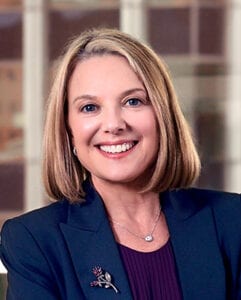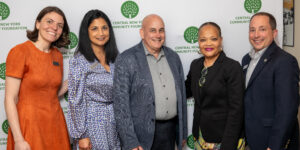A U.S. Trust study found that people want their financial advisors to ask them about charitable giving. In fact, a third of clients surveyed think the topic of charitable giving should be raised in the very first meeting. Yet fewer than half feel their advisors are good at discussing personal or charitable goals with them.
Wondering how to start a conversation about charitable giving with your clients? Or looking to refresh your approach? As part of an ongoing series, we’re asking some of Central New York’s most experienced professional advisors how they “pop the question” about charitable giving to their clients.
Hear from Anne Ruffer, Esq., Managing Partner and Member of Executive Committee, Mackenzie Hughes, LLP, on how she “pops the question.”
 Why do you think it is important to bring up the topic of charitable giving?
Why do you think it is important to bring up the topic of charitable giving?
As an attorney with a focus on estate planning, there are several reasons to bring up the topic of charitable giving with my clients.
First, charitable giving is a part of estate planning. It is the “Who do you want as my beneficiaries” part of the planning work. A client may or may not choose to include charitable organizations as beneficiaries of their estate but the topic of charitable giving ought to be raised to some extent in the beginning stages of planning. The topic of charitable giving is very personal to each individual and there is a range of responses to this initial inquiry.
Second, estate planning is a time for self-reflection and looking back at organizations that may have helped clients, or their family and friends, during their lifetime. They might want to provide similar opportunities to others in their community in the future by supporting those organizations.
Third, from an economic perspective, there may be tax incentives resulting from setting up a charitable giving plan for the client such as income and estate tax reductions.
How do you learn about your client’s charitable interests?
It usually comes up in a client’s estate planning meeting. I include questions such as, “Do you have any charitable goals?” or “Do you have any interest in giving to organizations in your community?” Other times I may raise the topic with tax incentive related explanations. If the client is interested, the conversation progresses further, and I share various planned giving options that best meets the client’s charitable goals.
At what point(s) in your process do you bring up/revisit the topic of charitable giving?
Oftentimes, individuals haven’t thought about charitable giving unless I bring it up, or if they have I am able to provide them with suggestions that they may not have considered. Moreover, if a client has charitable interests and specific objectives, then I may have an in-depth conversation with him/her and present the available planned giving options. However, I follow their lead based on our discussions. If they tell me that they are not interested, I respect that and move on to other aspects of estate planning.
What questions or ideas about charitable giving do you find resonate the most with your clients?
If the client is interested in charitable giving, the client typically has ideas on which nonprofits to designate as beneficiaries. However, if a client does not, we will often discuss the client’s background, causes the client feels strongly about, past educational and religious institutions that they were affiliated with, and any life events that affected the client’s life where the client feels an affinity to support. If the client cannot decide or has local areas of interest such as the arts or a service organization in Syracuse, but no specific charities, I may propose connecting the client with the Central New York Community Foundation to explore more, since the Community Foundation works with many local nonprofits and community initiatives.
How has your approach changed over the years?
With respect to charitable giving discussions, my approach with my clients has not changed much over the years except that where appropriate I recommend my clients to use tax-qualified assets such as retirement accounts to effectuate charitable giving on a more regular basis than I may have done in the past. This approach allows clients to designate non-taxable assets to individual beneficiaries while easily benefitting charitable organizations. It is not only beneficial for the donor, but also for the selected individual beneficiaries and charities. It’s a win-win for all!









